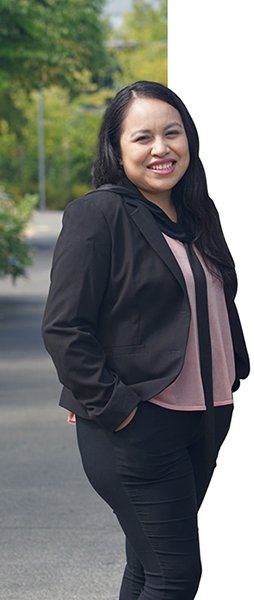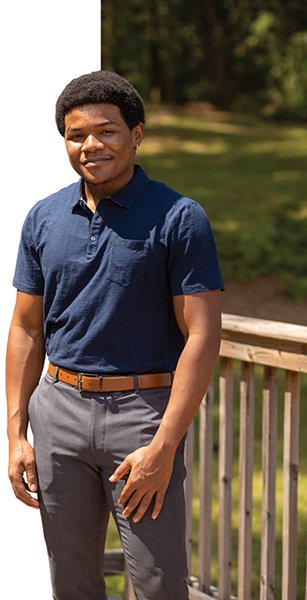People & Programs
Faith Singer
Launching Careers in STEM
Students turn inspiration, knowledge, and skills into careers
According to the Pew Research Center, Black and Hispanic workers remain underrepresented in the science, technology, engineering and math (STEM) workforce, including in computing jobs, which have seen considerable growth in recent years.
TACC’s Education and Outreach programs aim to address issues of equity and broaden diversity and participation in these fields. Many of the students who have participated in TACC’s programs have turned their inspiration, knowledge, and skills into careers. Here are two examples.
Fidelia Hernandez

Searching for a way to support her family, Fidelia Hernandez moved to the U.S. from Oaxaca, Mexico, seven years ago in search of a better education, better job opportunities, and a better life. She immediately began taking classes to learn English. Her passion to help her family and pursue higher education was palpable.
“I faced many challenges, but hopefully my story will help others,” Hernandez said. After considering healthcare, she became interested in cybersecurity as a career. Her first internship and research experience was with TACC’s Cyberinfrastructure Research 4 Social Change program in summer 2019.
Hernandez studied the Waller Creek District, an Austin landmark and urban waterway that helps reduce the risk of flooding in downtown Austin. She contributed to the Waller Creek virtual reality experience, which allows stakeholders to simultaneously view many geographical layers of water quality data.
“Fidelia is an extremely dedicated student,” said Anne Bowen, a research scientist in TACC’s Visualization Technologies Group. “She helped determine the key factors that would help the general public better understand the ecological importance of Waller Creek. Her efforts added a personal dimension to the data analysis that connected the viewer to the scientist in virtual reality.”
Said Hernandez: “I learned that I’m capable of doing more than I thought I could. I was exposed to different tools and programs that allowed me to analyze real data. It was an amazing experience to use these things in the real world.”
Currently, Hernandez lives in Seattle, Washington. This summer, she completed her degree in Cybersecurity and Forensics at Highline College. Next, she plans to earn a master’s degree and PhD in Cybersecurity and Engineering. UT Austin is one of the top schools on her list.
“I want to stay in touch with the people at TACC and the programs TACC has to improve STEM opportunities. I also want to send a positive message to women who feel they can’t pursue higher education because of barriers they may be facing.”
Tyshawn Ferrell
As an undergraduate student at Albany State University in Georgia, Tyshawn Ferrell became keen on computer science through his interest in biochemistry and ecology.
“I participated in a summer Research Experience for Undergraduates program at Miami University,” he said. “I was looking at ways to combat ecological problems which exposed me to molecular and computational concepts—that was my first experience with computer science.”

Fast forward to 2020 and the COVID-19 pandemic. While several student programs were cancelled that summer, TACC still offered STEM programs. Ferrell discovered the Cyberinfrastructure Research 4 Social Change project at TACC through word of mouth.
“I didn’t know what to expect because I was still new to computational science,” he said.
Ferrell hoped to combine his interests in biochemistry and ecology. He expressed this desire to Kelly Pierce, one of his TACC team members and mentors. They hatched a plan to incorporate his academic interests into a specific project.
“Tyshawn wanted to explore the potential for viral pathogens to spread between species,” Pierce said.
He developed and completed a project that combined computational tools and his knowledge of biochemistry to explore how genetic differences between cats, dogs, and livestock might influence their susceptibility to SARS-CoV-2.
“My TACC team encouraged me the whole time,” he said. “I learned not to split myself between biology and computational science. I used both disciplines to advance my research by figuring out the right balance and tackling my weaknesses on both sides.”
After he completed the TACC research experience, Ferrell returned to Albany State and graduated with a bachelor’s degree in Biology. He presented his research at the Annual Biomedical Research Conference for Minority Students, National Center for Undergraduate Research Conference, and Biomedical Graduate Research, Education and Training Diversity Conference.
“Using supercomputers has been a wonderful experience. They’re fast, but importantly, they touch our imaginations. If you have an idea you can create it through programming,” he said.
After being accepted to several graduate schools, Ferrell received a full scholarship to the Biochemistry, Cell and Developmental Biology program at Emory University. He started the program in fall 2021.
TACC’s Research Experiences for Undergraduate (REU) programs give students skills in advanced programming and problem-solving as they use cyberinfrastructure to conduct cutting-edge research in engineering, science, and computational medicine. Learn more: www.tacc.utexas.edu/reu.

